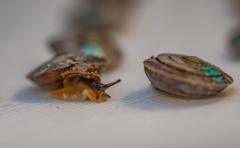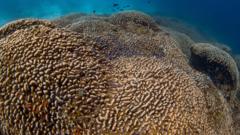On Christmas Day, an expedition by the Schmidt Ocean Institute revealed the first-ever live footage of the Antarctic gonate squid, a rare deep-sea cephalopod previously only known from remains found in fishing nets.
Discovery of the Elusive Antarctic Gonate Squid Marks a Historic First
Discovery of the Elusive Antarctic Gonate Squid Marks a Historic First
A groundbreaking sighting of the Antarctic gonate squid in its natural habitat has captivated researchers and marine enthusiasts alike.
In an exciting breakthrough for marine biology, researchers aboard the R/V Falkor (Too) of the Schmidt Ocean Institute made a historic observation of the Antarctic gonate squid, previously unseen alive. The remarkable sighting took place on Christmas Day, when the team set out to deploy their remotely operated vehicle (ROV), SuBastian, in the challenging waters of the Powell Basin. Due to shifting ice, the crew reluctantly altered their course, which unexpectedly led them to an unprecedented encounter at depths of 7,000 feet.
The ROV captured stunning footage of the elusive cephalopod, measuring about three feet in length and dramatically releasing a green ink cloud. Deep-sea researcher Andrew Thurber expressed his awe, describing the squid as "a beautiful creature" and noting that such encounters highlight the beauty and diversity of oceanic life.
This live encounter holds significant implications for our understanding of deep-sea ecosystems, providing insights into the behavior and biology of species seldom observed in their natural environments. Linsey Sala, a museum scientist who studies pelagic invertebrates, stated the importance of this discovery in studying the ecological dynamics at great depths, as previously unidentified specimens might be hidden away in museum collections.
In a world where many marine species remain enigmatic and under-researched, the sighting of the Antarctic gonate squid stands as a testament to the continuing exploration of the deep sea and the mysteries it holds. The footage not only contributes to marine science but also fuels excitement among conservationists and ocean lovers, emphasizing the need for ongoing research to reveal the secrets of our oceans.










